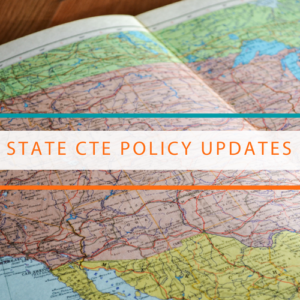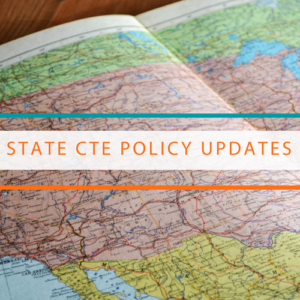 As the legislative sessions move forward, states have passed laws to examine and increase work-based learning opportunities for learners.
As the legislative sessions move forward, states have passed laws to examine and increase work-based learning opportunities for learners.
Some states, such as New Jersey, plan to launch pilot programs to expand access to work-based learning opportunities. In New Jersey, the state legislature passed S3065 in January to direct the Commissioner of Education to establish a three-year youth apprenticeship pilot program. The program will allow high school and college students to develop critical employability skills while earning a high school diploma or postsecondary credential. Employers participating in the program must pay the apprentice and offer an industry-recognized credential upon the completion of the program.
Other states are leveraging graduation requirements to incentivize work-based learning opportunities for students. In Virginia, Governor Ralph Northam signed HB516 into law in March. The law requires the Virginia Board of Education to include options for students to complete a high-quality work-based learning opportunity or a dual enrollment course in its high school graduation requirements.
In Tennessee, Governor Bill Lee signed HB736 into law in March to examine opportunities available to learners. The law requires the Office of Research and Education Accountability (OREA) to study and report on whether community schools are providing on-the-job training opportunities to learners by working with community partners or businesses. Specifically, the law directs OREA to examine the number of learners participating in on-the-job training opportunities provided by community schools and whether these opportunities have resulted in students obtaining employment after high school.
Brianna McCain, Policy Associate


 Many governors leveraged their State of the State Addresses to address CTE funding. In Maine,
Many governors leveraged their State of the State Addresses to address CTE funding. In Maine,  Some states are exploring how to leverage apprenticeships to award college credit to learners. For instance, the Colorado legislature passed
Some states are exploring how to leverage apprenticeships to award college credit to learners. For instance, the Colorado legislature passed  As the legislative session moves forward, states have passed laws to increase awareness of and expand access to Career Technical Education (CTE) opportunities for each learner.
As the legislative session moves forward, states have passed laws to increase awareness of and expand access to Career Technical Education (CTE) opportunities for each learner. Digital literacy and computer science skills are increasingly necessary for success in today’s workforce, even in fields that are not directly related to information technology. As such, state leaders are recognizing the role that a robust computer science education strategy plays in preparing learners for their future careers and numerous states passed policies related to computer science during their 2018 legislative sessions.
Digital literacy and computer science skills are increasingly necessary for success in today’s workforce, even in fields that are not directly related to information technology. As such, state leaders are recognizing the role that a robust computer science education strategy plays in preparing learners for their future careers and numerous states passed policies related to computer science during their 2018 legislative sessions. The majority of 2018 state legislative sessions have come to a close. During these legislative sessions, states enacted budgets that illustrate a continued commitment to invest in Career Technical Education (CTE) and opportunities for learners to earn credentials that translate into high-skill, in-demand occupations.
The majority of 2018 state legislative sessions have come to a close. During these legislative sessions, states enacted budgets that illustrate a continued commitment to invest in Career Technical Education (CTE) and opportunities for learners to earn credentials that translate into high-skill, in-demand occupations. In
In